 A cautionary tale for anyone who uses Amazon to publish their titles in paperback, whether independently or through a publisher. If you have only ever used KDP then there shouldn’t be any problem, but for anyone who uses, or has used, a third-party printing service, this could be a bear trap waiting for you. If you are a small publisher, then this is definitely something of which you should be aware. Now, as we know, Amazon are a huge global internet supplier, not just of books but for pretty much anything. If they were a High Street (or Main Street if you prefer) outlet they would be present not just in very High Street in Europe and North American, they would be present in villages in the middle of Borneo that no outsider has ever seen. That’s how big they are. So, you would think that they would have simple processes in place for the resolution of issues. You would be wrong to think that. Several of the authors we represent used to publish through another small publisher. I’ll call them Fabulous Publishing for the sake of anonymity. A couple of years ago the owner of Fabulous Publishing decided he didn’t want to be a publisher anymore and closed his company down. As part of the close-down, Fabulous Publishing unpublished all the titles they had listed on Amazon (and on other etail sites). Fabulous Publishing also returned the publishing rights for the titles to the authors, so they could go elsewhere to be published, if they wished. Some of those authors went to a publisher we’ll call Selfishgenie Publishing, because we don’t require anonymity. Yes, we signed them and published their books, both as ebooks and as paperbacks. But Fabulous Publishing used a third-party printer to print their paperbacks. We’ll call them Wonderful Printing. They are a big company; they know what they are doing. When Fabulous Publishing closed down, Wonderful Printing contacted Amazon and told them that the relevant titles were no longer available as paperbacks through them and asked Amazon to “de-list” them. You would think that would be the end of the matter – but if it was, you wouldn’t be reading this blog because I would have no story to tell. "And that is where we hit our first speed bump." You will be familiar with Amazon Marketplace. This is where small traders sell goods using Amazon’s platform as their sales channel, for which Amazon receives a slice of the action. There’s nothing wrong with that, it makes good sense to “sweat the assets” as it’s known in business. But one of the things those small traders sometimes sell is second-hand books. And that is where we hit our first speed bump. Because a trader was selling one copy of a title by one of our authors, we couldn’t sell any of the paperback of the same title that we had published. Until that second-hand copy was sold, the listing showed the paperback as being the one published by Fabulous Publishing. But you couldn’t actually buy a brand new copy of Fabulous Publishing's product because it was no longer being printed by Wonderful Printing. We submitted a complaint and were told by Amazon that the trader selling his second-hand copy was entitled to do so and until that copy had been sold, all the publishing details for the paperback version of the title had to remain as "Fabulous Publishing" and our brand-new paperbacks couldn’t be displayed. That was it – we couldn’t sell any of this title as a paperback until Joe Shmo from Nowheresville had sold his second-hand copy. The only way out of this was for our author to buy the second-hand copy so that the listing could be changed. So, problem solved. "So, we went back to Amazon and asked them to fix it." No it wasn’t. The listing for the paperback was still showing as the one for Fabulous Publishing which, as already established, isn’t available. While our edition was available but couldn’t be purchased because of this ridiculous "through the looking glass" situation. So, we went back to Amazon and asked them to fix it. Their reply was that they couldn’t take instructions to fix it from us. It had to come from Fabulous Publishing who, of course, no longer exist. Fortunately, the former owner of Fabulous Publishing is a personal friend and was happy to help. He contacted Amazon with details of not just that title, but all the other titles that he had published as paperbacks and asked for them to be de-listed. (But imagine if there was no way of contacting Fabulous Publishing anymore? We definitely dodged a bullet there). The reply he got surprised him. Because the sales channel for the paperbacks had been set up by Wonderful Printing, on behalf of Fabulous Publishing, they couldn’t take instructions from Fabulous Publishing either. Only Wonderful Printing could make the request. "This time we really were in a dead end." So, (the former) Fabulous Publishing contacted Wonderful Printing, who contacted Amazon. Amazon told them how to delist the titles. But when Wonderful Printing tried to follow the instructions, Wonderful Printing were told they weren’t authorised to do so. This time we really were in a dead end. So, we here at Selfishgenie Publishing still can’t publish those paperback titles formerly published by Fabulous Printing. "So Amazon are lying to their customers." And Amazon’s response? Basically they are saying that Wonderful Printing are the problem, even though I have seen the emails that show clearly that Wonderful Printing have done everything asked of them. If you go onto Amazon to try to buy a copy of the paperback book, it shows that there is one in stock. This is normal for “Print on Demand” (POD) books. But if you click to buy it and put it in your basket, you are then told it is “temporarily out of stock”. No it isn’t temporarily out of stock. The product sold by that publisher is permanently out of stock. So Amazon are lying to their customers. Meanwhile, Selfishgenie publishing, who would gladly sell you a copy of the book, is unable to do so. This is the Alice in Wonderland world of Amazon for you. "But we need your help." The biggest irony of all, and the one that Amazon fails to see, is that while we are down this rabbit hole where neither we nor our authors can make any money by selling the paperbacks - neither can Amazon! Yes, we are using Jeff Bezos's resources and he is getting nothing out of it. Is it case closed? Not quite, we hope. But we need your help. If you think that Amazon are behaving like a bunch of clowns, then please help by sending this blog viral, so that the whole world can understand what an intransigent bunch of idiots actually manage Amazon. My thanks to the real people behind both Fabulous Publishing and Wonderful Printing for their help in trying to resolve this issue. You know who you are and I owe you a drink. And if anyone with half a brain at Amazon is reading this and can get us out of this mess, you’ll find our email address on our “Contacts” page. I’ll be happy to provide you with copies of all the correspondence. But do not despair. You can still get most of our other books in paperback versions if you want them. To find out how, click on the "Books" tab at the top of the page. PS. To be absolutely fair to Amazon, about 10 days after publishing this blog, the issues described above were resolved and the paperbacks we publish are now being correctly displayed on the relevant sales pages.
It would have been much better all round if they had been resolved before our patience snapped and we resorted to blogging about the problem, but we got there in the end.
0 Comments
 Picking a title for a book isn’t always easy. Sometimes the title picks itself, based on the plot or the leading character. But sometimes it isn’t quite so obvious. “Oranges Are Not The Only Fruit” by Janet Winterson, for example, isn’t a title that you might associate with a book about “religious excess and human obsession”, to quote from the book’s blurb. But it’s a best seller, so its readers obviously weren’t the type to be put off by an opaque title. However, is there more to it than just a having snappy title? What if you are publishing a collection of work that has been previously published. This happened to one of our authors, Robert Cubitt.  He had published a series of nine sci-fi novels under nine different titles, but the series collection was called, simply, “The Magi”. If anyone has read the book then that title makes sense, because the series is all about the search for the Magi, who are the rulers of the galaxy and they’ve gone missing. So far, so good. Each book in the series has its own title, but the first book gives the series its collective name. But what do you call the collection when you put all 9 books out under a single cover? Robert chose to call it “The Magi Omnibus”. It made sense to him, because an omnibus, as well as being a mode of transport, is a collection of stories either with a common theme or by the same author. So, tick the box on both counts. For the same reason the title also made sense to us. "sales started to tick upwards at once" But it turns out that not everyone seems to know that the word omnibus means a collection of work. The word has become old-fashioned, out of date. It also doesn’t resonate with non-UK readers. Robert’s generation grew up on the omnibus edition of “The Archers” broadcast on the radio every Sunday morning, which is all 5 daily episodes, each of 15 minutes duration, broadcast as a single 75 minute edition. There are also omnibus editions of some TV soap operas, such as Eastenders and Coronation Street. So, you would think that the term omnibus would be well known.  It appears we were wrong about that. While we weren’t looking, the omnibus has been replaced by the “box set”. And that was reflected in our sales for the collection. We were getting plenty of clicks on links to the book’s sales pages, but no buyers. We can only assume that potential purchasers were confused by the title, thinking it referred to the aforementioned mode of transport. So, we retitled it as “The Magi Box Set” to see what would happen. And sales started to tick upwards at once. It seems that the readers of sci-fi are happy to buy a box set, but they aren’t interested in buying an omnibus.  OK, lesson learnt. A title change can make all the difference in the world for some books. So, if your book isn’t selling, you might want to ask yourself what the title is saying to your potential readers. Ours was obviously saying “Radio 4” when we wanted it to say SYFY Channel or Netflix. This isn’t a phenomenon that is unique to the publishing industry. Plenty of films have been retitled because the original title didn’t go down well with test audiences, either at home or abroad. I’ll give you an example. The film “The Madness George III” was retitled “The Madness of King George” for the American market, because the producers thought that with so many films being released in series (eg Rocky, Rocky II, Rocky III etc), audiences might not go to see the film because they might think they’d missed The Madness of George I and II. Mad Max is a well-known film name these days, but very few people in the USA had seen the first film in the series, so when the second film was released in the USA it had a name change to “The Road Warrior” without any reference to Mad Max – and it worked  Will Smith in "Hancock" Will Smith in "Hancock" You may be familiar with “Indiana Jones and the Raiders of the Lost Ark” and if you are, you didn’t see it when it was originally released – or your memory is playing tricks on you. When it was released in 1981, it was just “Raiders of the Lost Ark” and was retitled later by George Lucas in order to fit in with the titling of the sequels, which did use the style “Indian Jones and ….” The Will Smith superhero movie “Hancock” (2008) didn’t start out with that name. It had the very generic title of “Tonight He Comes”. Would you have gone to see it with that title? It might have worked in the 1930s, but not in the modern market. So, if your book isn’t setting the reading world on fire, you might consider a change of title. But do include a note inside giving the original title, so people will know if they have already read it. No point in upsetting people by letting them buy the same book twice. Amazon gets a bit touchy about that too. Would you like a full-length eBook for free?* Of course you would. All you have to do is sign up for our newsletter to qualify. Just click the button. *Excludes "The Magi Box Set".  Why do so many authors suffer from “Imposter Syndrome”? It seems that every other Tweet or Facebook post that I see from authors doubts their ability to write, yet they are unlikely to choose writing as a career (or at least an ambition for a career) unless they actually are able to write in a coherent manner. I’m not talking about false modesty, or “humblebragging” as it is sometimes known, which I also see a lot of. That is a whole different thing. A typical humblebrag would look something like “I can’t believe it! I’ve just been asked for a full MS from an agent!” (the exclamation marks are typical of humblebragging punctuation). The use of “I can’t believe it” doesn’t make the brag about being asked for a full MS any less of a brag.  I’ve got nothing against the bragging part of it. If an author has been asked for a full MS by an agent, or has just signed a publishing deal, or has just sold the first copy of their book, then that is something worth bragging about. No, it’s actually the “humble” part I don’t like. The author isn’t fooling anyone with it. Own it, boys and girls; just own it. But imposter syndrome is something very different. Imposter syndrome is a feeling that successful people get that they aren’t worthy of the accolades that they are receiving. They feel that they don’t deserve it and that it has all been a big mistake and one day they’re going to get found out.  Most common amongst women and people of colour. Most common amongst women and people of colour. The term was first used by psychologists Pauline Clance and Susanne Imes in their 1978 research paper on the subject. They noticed that a lot of their female students seemed to feel that they didn’t deserve their places in college, even though they were more than capable. Their research was mainly conducted on women, who seemed to suffer a lot from imposter syndrome, possibly because women have historically had their abilities questioned (especially by men), so they have come to question it themselves. Later research found similar behaviour in people of colour for pretty much the same reason. More recent research has shown that anyone can suffer from imposter syndrome, but it is more common amongst women and people of colour. "But why do so many authors appear to suffer from it? " At its worst, imposter syndrome can lead to mental health issues because of the anxiety it causes sufferers. At its best it creates self-doubt, which is demotivating and it can lead to self-sabotaging behaviour, such as perfectionism. It doesn’t matter how many times people tell sufferers that they are good at what they do, imposter syndrome will always undermine any sense of achievement. But why do so many authors appear to suffer from it? There are a couple of reasons why we do suffer. One of the greatest is family and friends who don’t seem to think we have what it takes to write a book. They can believe in us as carpenters, plumbers, bank managers, marketing executives or whatever because we are, or were, employed as those. But you have to be special to be an author, right? Actually, no, you don’t have to be special, as any author can tell you. All you have to have is an idea, a basic sense of plot and character construction (both of which can be learned) and some basic written English skills.  You - an author? You - an author? But that lack of faith in us can undermine our own view of ourselves, especially if said friends and family haven’t actually read our books, so they continue to doubt us without having any evidence of our true capabilities. It goes back to the research carried out by Clance and Imes, where people (generally males) didn’t have faith in the capabilities of women, so women tended to absorb that lack of faith and reflect it back upon themselves. Just try being blond as well and see how much worse that feeling might be. But I think that the other main reason is that we are too ready to compare ourselves to the great figures of literature and we don’t feel we measure up well. And I think this stems from the way literature is taught in schools. This creates false comparisons. 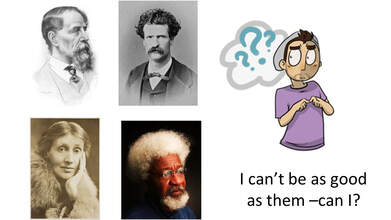 In all professions there are leading lights; the great movers and shakers who change their industry or redefine their art in some way. Let’s keep away from writing for the moment and use music as an example. Mozart, Beethoven, Chopin and similar figures are held up as the benchmarks against which all other musicianship must be judged, or so we would be led to believe if our high school music teachers had their way. I’m not going to question the abilities of those composers, they were undoubtedly great, but that doesn’t mean that every other composer or musician isn’t also competent. Our orchestras are full of competent musicians, of which a few will be recognised as great soloists. Some might even earn the title of “Maestro” or “Maestra”. But that doesn’t mean the rest are bad. We can extend the argument into the realm of pop music. Lennon and McCartney wrote great songs and the Beatles were a great band. But that doesn’t mean that no one since has written a great pop song, nor that any band since wasn’t as good as The Beatles. By and large it is the paying public who decides which bands are great and which aren’t – not high school music teachers.  Just how much do I suck? Just how much do I suck? The same applies to literature. It is the book buying public that decides who is a “great” author, not English Literature tutors. The teachers can examine a book and tell you why it is well written and why it was hailed as a “classic”, but that is not the same thing as the author being popular. If it were, then Dickens and Twain would always be in the best sellers lists and no one would ever have heard of Dan Brown. If you only compare yourself to Charles Dickens, Mark Twain or Virginia Woolf, you may feel like an imposter. The same applies to modern writers. We’re not all going to win the Booker Prize or the Nobel Prize for Literature. But just because you aren’t spoken of in the same way as the winners doesn’t mean that you are unworthy of any success you may achieve. Stop beating yourself up, as the saying goes. If readers are buying your books and you are getting good reviews, it means you are a good writer. Enjoy that feeling.  Just because your books don’t make it into the Sunday Times (or New York Times) best sellers list, it doesn’t make you an imposter. You have to sell around 100,000 copies to make even the lowest entry into those lists and very few authors manage that in a year (about a hundred, in fact). So, if you only sold 90,000 copies, it doesn’t make you an imposter. And even if you only sold 1 copy, it doesn’t make you an imposter. All that means is that you haven’t yet been discovered and you need to do more marketing to get your books in front of the reading public’s noses. But above all you must remember that you chose to be a writer. No one puts a gun to an author’s head and makes them write. What made you choose to write was the desire to tell stories. And so long as you continue to tell stories, you will never be an imposter. If you have enjoyed this blog, or found it informative, be sure not miss future posts by signing up to our newsletter. Just click on the button below and you will also qualify for a FREE eBook.. 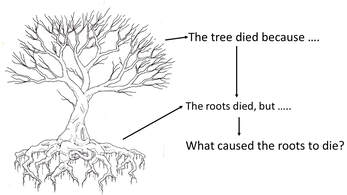 "Root Cause" "Root Cause" There is something in the field of quality management called “root cause analysis”. You may now be asking what this has to do with writing books. I’ll get to that in a minute or two, but first of all I’ll have to explain what root cause analysis is and how it works. Basically, it is an assumption that when something goes wrong in a process, the visible signs are very rarely the root cause of what went wrong. To make sure that the same problem never occurs again, you have to find the root, or real, cause of the problem. It is the difference between treating the symptoms (a headache, say) and treating the cause (a brain tumour). Aspirin may temporarily relieve the pain of the symptom, but it won’t cure the brain tumour. Let me give you a worked example.  Guess the cause! Guess the cause! Car A is driving along the road and approaches a stop sign. Being driven by a good driver, the car is brought to a controlled stop in the right place. Car B, following on behind, then crashes into the back of Car A. The assumption, at this point, might be that the driver of Car B wasn’t paying adequate attention and therefore didn’t see Car A coming to a stop and ran into the back of him. Only by asking questions would it be possible to establish if that assumption was correct. In quality management a tool that is used is called “The 6 Whys”. Basically it means that by asking six “why” questions in succession it is possible to find out what the real cause of the accident was. So, question 1 might be “Why did the driver of Car B fail to stop? There are several possible answers, only one of which will be true. For the sake of this illustration, I’ll say that the actual answer is “Because the car’s brakes failed.” The second why question would therefore be “Why did the brakes fail?” Again, there are several possible answers, only one of which will be true. If you ask a further 4 “why” questions in this vein you might get to an answer that is “Because there is a flaw in the manufacturing process for a minor component that hadn’t been previously identified”. Obviously more evidence than just one accident would be needed before that conclusion could be drawn, but gathering that evidence, such as data on other accidents, would be part of finding the true answer.  Brake failure? Or inattentive driver? Brake failure? Or inattentive driver? So, the root cause of the accident is that flaw in the manufacturing process and unless that flaw is corrected, other accidents involving brake failures are bound to occur. That is a long way from “Driver B wasn’t paying attention to his driving”. It is just that sort of process that leads to product recalls on cars, sometimes several years after production started, to rectify defects that have been subsequently identified. If you work in a place where the same problems keep on occurring, time after time, then you might want to carry out this exercise for yourself, or in conjunction with your colleagues. By identifying the root cause of those problems – and getting them fixed - you could earn yourself some kudos (and all that goes with it). Even if Driver B wasn’t paying attention, to get to the root cause of the accident we would have to ask another 5 questions. It might turn out that he is suffering from undiagnosed ADHD, for example, rather than just being distracted by his phone ringing.  It's not just icebergs that have hidden depths. It's not just icebergs that have hidden depths. But that leads us onto the real subject of this blog: What does this mean for you as an author? It means that you can build multi-layered characters by showing your readers that what they see on the surface isn’t necessarily what is going on underneath. In characterisation, we call this “having hidden depths”. Let’s take a typical character trope, the cop who drinks too much and prefers to work alone. It’s easy to establish that he drinks too much because his partner got killed in a shoot-out and that he wants to work alone because he’s reluctant to get emotionally attached to other cops in case the same thing happens again. Those are just the answers to the first 2 or 3 “whys”. But if you were to ask yourself a 4th why you might find out that the cop has suffered major losses in his life before. A 5th why might be that he feels responsible for the earlier loss and the 6th why is because he was blamed for the loss even though he was too young to even know what loss was about.  Anyone who has ever gone through counselling (therapy as our American cousins call it) may recognise the depth of questioning necessary to reveal those sorts of emotional scars. But as an author, you can build that character from the ground up to give them hidden depths and secret anxieties. More importantly, you develop them from being a trope into being a ‘real’ person. You don’t have to reveal all that to the reader, at least, not all in one go. It may be something that you keep to yourself or reveal over a series of stories. But when it comes to deciding how your character(s) will react in any situation you put them into, you can draw on that depth of understanding of their emotional baggage to make them more interesting, to make them react consistently and to make them believable.  Emotional engagement. Emotional engagement. In many novels it is very difficult to understand what motivates a character if the author hasn’t actually explained it. Because of that it is difficult to believe in the character and a lack of belief creates a lack of emotional engagement from the reader. And if the reader doesn’t engage with the character on an emotional level, they don’t care what happens to them and they stop reading the book. That might not matter if you only write one book. After all, the reader has already bought it. But if you want to write a second book, it is important. If your first book didn’t engage the reader, they won’t buy your second book. And if they post a bad review of your first book, it will impact sales to other people for all your books, even if they are in a different genre. So having interesting characters is a big deal. This is the difference between plot led and character led fiction, which is an on-going debate in writing circles. Here at Selfishgenie we’re very much in the ‘character led’ camp because a good plot can’t make up for badly drawn characters. Good characters, however, can save a poor plot – as many a Hollywood movie has demonstrated. Why would my character do that? The place to start in this “root cause” journey is with the initiating event, as it’s known. The things that gets the story moving and gets the character involved in the action. Ask yourself “Why would my character do that? What is their motivation? Is that motivation enough to keep them going when the going gets tough?”  A simple Hobbit A simple Hobbit These are questions I asked myself a lot when reading Lord of the Rings. As in “Would a simple Hobbit really keep going in the face of all that opposition? Wouldn’t they just throw the flipping ring into the neatest river and hope for the best?” I’ve read the book several times and the character of Frodo always makes me ask those questions and I’ve never really reached a satisfactory answer. Strength of character and determination to succeed don’t even begin to satisfy as motives. In some types of plot, the triggering event goes with the territory, because it’s the character’s job: police stories, spy thrillers etc. In those cases we have to take a step back and ask questions about why the character got into their job in the first place, as well as why they stay in it when things are going so badly. When we give feedback to authors who submit their manuscripts to us, we often refer to characters being “two dimensional”. It is the deeper motivation of characters that give them their third dimension and make them more human, more realistic. This is especially important if the characters are to go beyond the everyday experiences which we all go through and into worlds where they place themselves in mortal danger. We know we couldn’t do those things – but we have to believe that the character(s) can. Motivation is what makes us believe and motivation comes from deep within – whether we are real people or characters in books. I’m not saying that this sort of analysis is the only way to build good characters – there are many others, I’m sure. But if you are struggling with creating believable characters, this simple tool, "the 6 whys", may help you to add new dimensions to them. If you have enjoyed this blog or found it informative, why not make sure you don't miss future editions by signing up for our newsletter. Just click the button below and you will also qualify for a FREE eBook. 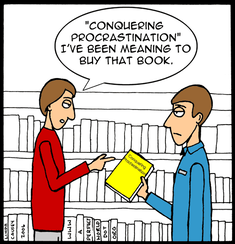 In 1742, poet Edward Young said “Procrastination is the thief of time”. Mind you, he didn’t actually get around to saying it out loud until 1743. No, that’s just my little joke. He said it in the poem “Night Thoughts on Life, Death and Immortality”. I’m not sure if authors are the worst when it comes to procrastination, but if the Selfishgenie Twitter feed is anything to go by, it certainly seems to be that way. In fact, research suggests that 95% of people procrastinate to some degree. It’s just more of a problem for some people than it is for others. Procrastination is not the same as laziness. Many procrastinators are actually highly productive; it’s just that what they produce isn’t necessarily what is important. 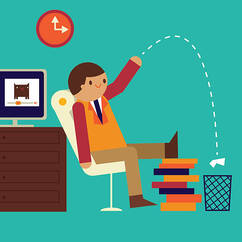 For example, my own favoured form of procrastination is writing blogs. Especially when I should be editing. Either that or writing wonderfully crafted letters to the media about something of great importance in the world. Some of them have even been published - but compared to what I should be doing, they aren't important. At the extreme end of the scale ADHD, OCD, anxiety and depression are all associated with procrastination. So, you could actually be harming your mental health by not doing what you know you should be doing. Procrastination definitely causes feelings of tension and stress, which are both triggers for anxiety and depression. Social media is one of the places where you will find a lot of people procrastinating. It is the ideal place for them to go. They may genuinely mean it when they say “I’ll just take a quick look, just to see what’s trending.” Then, 3 hours later, they’re still there and haven’t done a single bit of work, whatever their work may be.  There are many reasons why people procrastinate. Some believe that they work better if they are up against a deadline. Back in the old days, when I used to manage a team, I could always tell when someone produced their work right at the last minute. For a start, it was usually substandard because it hadn’t been given enough time for research, colleague input, proof reading, editing or re-writes. Or maybe I was just able to recognise the hunted look in my team member’s eyes when they saw me approaching, knowing that at any moment I might ask to see the work I’d asked them to produce a week before and was due on my desk in under an hour and they hadn’t even started it. Other people procrastinate because they think that whatever needs to be done will be challenging in some way and they want to put the task off in the hope that it will go away (it rarely does). That’s not good for an author. If you have an idea for a story, but you are putting off writing it, then you have to ask yourself if you are really cut out to be an author. If you aren’t contracted to produce a book by a certain date, then the only person who is going to suffer from any delay is you. You are bound to feel frustrated if you haven’t even made a start on it. 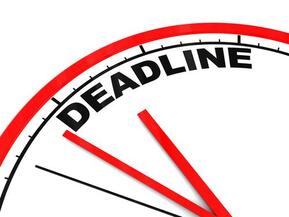 And if you are working to a contractually binding deadline, then re-read my observation above about work being substandard if it’s left to the last minute. I know plenty of authors who procrastinate not because they don’t want to write the story, but because they are worried that when they have finished and they try to find an agent or a publisher, no one will be interested. Or if they self-publish, no one will want to read their book. This fear puts them off finishing their work, because they don’t want to have to face that judgement. So, instead, they will re-write the same chapter (or paragraph or even sentence) time after time, telling themselves they’re trying to find perfection. But all they are really doing is putting off finishing their book. 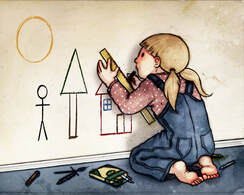 Procrastination and perfectionism go hand in hand. Procrastination and perfectionism go hand in hand. Procrastination and perfectionism are well known to go hand in hand. The question is, does the desire for perfection lead to procrastination, or does the desire to procrastinate lead to perfectionism? What we don’t admit is that there is no such thing as ‘perfect’, but there is plenty of ‘good enough’. This is essentially fear of the unknown. The author doesn’t know how good their work is and is afraid it might not be good enough. A pessimist is more likely to procrastinate than an optimist under those circumstances. Journalist James Surowiecki said that many procrastinators are ‘self handicappers’. Rather than risk failure, they create conditions that make success impossible. I think most procrastinating authors can relate to that. Other people procrastinate because they are worried that when they have finished whatever they are doing, they won’t have anything to move onto, which will leave their lives feeling empty.  Essentially there are three types of procrastinator: those that do nothing (or hang around on social media, which amounts to the same thing), those who do something less important than what they should be doing, or those who do something that they consider to be more important. Surprisingly, getting unimportant things done and getting more important things done are both regarded as being ‘good’ forms of procrastination. By getting the unimportant stuff out of the way, we actually create time to do the more important task, without having to step away from it later to return to the mundane tasks. For example, you want to spend three hours writing, but instead you find yourself doing the laundry, preparing dinner and walking the dog. But that’s great because when you start writing, you won’t have to stop and do those things later and you can focus for three hours non-stop. Doing more important stuff, rather than sitting down and doing the thing you want to, eg writing, also works. So when you do sit down for a couple of hours to write you (a) haven’t anything more important to do that is nagging at you and (b) you can feel virtuous for getting the important stuff out of the way first. "But there are some things you can do to defeat procrastination." But is there an actual ‘cure’ for procrastination? The first thing to do is identify why you are procrastinating. I have suggested a few reasons already, but there are probably more. Only you can know why you are either delaying starting things or delaying finishing them (both are forms of procrastination). Once you have answered the “why” question, you can then start to address the issues, such as lack of confidence in your own ability. But there are some things you can do to defeat procrastination. Commit to the task. Focus on doing, not delaying. It may be helpful to set yourself a deadline for completing something. Perhaps saying “I will write 1,000 words by 4 pm.” Promise yourself a reward for completing what you set out to do. It doesn’t have to be something big, just a 10 minute break for a cup of coffee, or maybe a slice of cake with the coffee you were going to have anyway. Or perhaps 10 minutes catching-up on social media (but make sure it is just 10 minutes).  Minimise distractions Minimise distractions Re-phrase your wording. Don’t say “I need to” or “I have to”, say “I want to” or “I choose to” instead. It is far more likely that we will do the things we want to do than the things we feel we have to do. Minimise distractions. I know, more easily said than done, especially if you have family buzzing around in the background or demanding work colleagues. But there are things you can do. Log-off all social media, so it isn’t pinging away in the background, tempting you into paying it attention. Close down your emails, unplug/switch off the phone, close the door. And if you can’t escape from the family, then work at a time when the family aren’t going to be so much of a problem. For example, if you have a young child, work when the child is napping. Work when older children are at school or organise play dates for them, so they aren’t calling on your time. And tell your partner to make their own damn coffee. If a colleague is demanding attention, agree a set time to meet, when it’s convenient for you (if procrastination is the thief of time, demanding work colleagues are master criminals). If the task is a really big one, break it down into much smaller chunks. Don’t set out to write a book. Set out to write a paragraph – or even a sentence. When you have completed that, write the next paragraph and so on. John F Kennedy may have set a goal of putting a man on the Moon, but NASA actually achieved that goal by solving one small problem at a time. 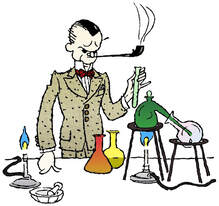 Coffee based procrastination Coffee based procrastination As mentioned above, get the routine chores out of the way first – and quickly. You can then concentrate on what you want to do without feeling any guilt. Don’t turn small things into big ones. A cup of coffee really is just a cup of coffee. It doesn’t have to be made with hand ground beans which you have to slow roast first. Yes, we know those people. We may even be those people. If you want a slice of cake you don’t have to bake it, you can just buy it. You know you are procrastinating when you actually start looking for those sorts of time-wasting activities. But it all starts with knowing that you are procrastinating in the first place. If you don’t realise you are doing it, you can never hope to stop doing it. If you have enjoyed this blog, or found it informative, be sure not to miss future editions by subscribing to our newsletter. Just click on the button below - and you can also get a FREE eBook for subscribing. But don't procrastinate - do it now.  Internet trolls! They get everywhere these days. They’re mainly to be found on social media sites such as Facebook and Twitter, but they can turn up anywhere. You’ll find them in the reviews section of Amazon and other retail sites (the 1 star end of the scale, naturally). They also appear on Goodreads and similar sites. It wouldn’t surprise me if a couple turned up in the comments section of this blog because, let’s face it, they’re not going to like what I have to say about them. I’m not sure if trolls attack authors any more than they attack anyone else, but let’s face it, if you are trying to do something worthwhile, someone will always try to bring you down, which is pretty much the job description of a troll. Some of them may not even think of themselves as being trolls. They just think they're "telling it like it is" (or similar euphemisms to justify obnoxious behaviour) It's easy to say “block them and move on”, but the hurt has already been felt the moment the words are read. And that’s what the trolls know. You can’t un-see and you can’t un-feel. It can leave you feeling low for the rest of the day and even longer. It can make you want to hurt them back, even though you are a nice person who wouldn’t otherwise dream of hurting anyone. It can even make you want to hurt yourself.  It would be nice if the social media platforms et al were to do something about them, but trolls are customers too, so they don’t take action. Not that the trolls spend any money, but the platforms do receive income from any ‘clicks’ they might make on adverts during their daily round of trolling. That was how I experienced my most recent interaction with a troll. I was doing an on-line book promotion for one of our authors, offering a free download of one of his books. I paid a certain social media giant to get that message in front of ‘interested’ users of the platform and, a few days into the promo I received a comment saying “You can’t reduce the price low enough for me to buy this book.” Not the greatest insult in the world, I grant you. Oscar Wilde, if he were still alive, would have no worries about that person stealing his laurels, but it didn’t stop it being a little bit hurtful for the author. "Yes, I actually paid to be trolled." The thing is, because the troll had responded to the advert, I had to pay the social media company. Yes, I actually paid to be trolled. So, I blocked him and moved on. Only I didn’t, did I? Because if I had, you wouldn’t be reading this blog. There are a couple of things we can guess about the person who made the comment. The first things is that he (they are predominantly male) hadn’t actually read any of our books. The second is that they probably don’t read books in the first place. Books enlighten and trolling is a product of ignorance. So, what motivates trolls? "So why do they do it?" It would be easy to dismiss their behaviour as the modern equivalent of the school bully. They do it because they can. But that shows a lack of understanding of bullies. Bullies do what they do not just because they can, but because it demonstrates their power over their victims, especially to those people that hang around bullies, desperate not to become victims themselves. Trolls don’t have hangers on like that, so what they do doesn’t demonstrate their power to anyone. Even those people who actually see the insult on social media won’t know the true identity of the person who posted it. So why do they do it? The real reasons are different and they are several. Trolls don’t all do it for the same reason. Dr Mark Griffiths, Professor of Behavioural Addiction at Nottingham Trent University, gave four reasons: revenge, for attention, out of boredom and for personal amusement. Yes, they find it funny, even if no one else does.  I wouldn’t want to disagree with Dr Griffiths (but you know I’m going to) but I think it runs deeper. I think that the lives of most trolls are so empty and unfulfilled that they can’t stand to see anyone who is living a happy, fulfilled life, so they try to bring them down in the only way available to them. They are similar to the vandals who trash parks, gardens and beauty spots. Their own lives are so bleak and lacking beauty that they can’t stand to see beauty anywhere else. So, you are a happy fulfilled person, expressing your views on Twitter or Facebook, celebrating your successes, bemoaning your minor failures or promoting your work. And they can’t stand your sense of wellbeing, your apparent success, the fact that your problems are quite small compared to theirs and that you are actually achieving things through your work. They can’t stand the fact that you are doing something worthwhile. So they set out to damage that sense of wellbeing. Well, what about the people who are suffering larger problems, like mental health issues, illness or bereavement? They get trolled too. "It gives them an even greater thrill." . Yes they do, but for much the same reason. It’s not enough for the troll that you are feeling low because of whatever is happening in your life. No, that just makes you a soft target. They can make you feel even worse, which is what they want to do. It is a form of sadism. It gives them an even greater thrill. Of course, they have nothing to feel good about. Their lives are still as vacuous as they were before. Their existence is still as pointless. If they are lonely, they will still be lonely. If they are poor and/or unemployed, they will still be poor and/or unemployed. If they can’t form proper relationships, they will still be unable to do so. If their boss is always on their back at work, their boss will still be on their back at work. But for a fleeting few seconds after they hit the key to post their nasty little insult, they feel powerful. In that instant they no longer feel like the losers that they really are. Of course, it doesn’t last. As I said earlier, there is no one there to see their power, so they can’t bask in the fake adoration of their minions. The feeling is so fleeting that they have to start looking for a new target almost immediately. Which is why most trolls spend so much time on-line in the first place. They are addicted to that fleeting moment of pleasure, because they can’t get it anywhere else. 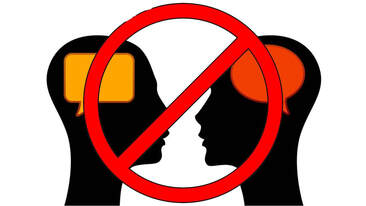 OK, understanding what makes a troll tick doesn’t do anything to get rid of them. Is there actually anything you can do? The first and most important thing is DO NOT INTERACT. If you respond in any way they will know they got to you and that increases their feeling of pleasure. Even if they have sent you into floods of tears, they mustn’t know that they have had any effect on you at all. Report their behaviour. In the short term not much will happen, but if enough people report them, they will be banned from the site. Their IP address will be blocked, which means they won’t be able to re-register under another name unless they do so from a different IP address. Eventually they’ll run out of tech they can use and will have to resort to internet cafes, which cost money. The next thing you must do is block them (if the site has that facility). If not, use whatever contact facilities are available to you to get the troll blocked. On most platforms they won’t even know you have blocked them, but at least it’s one less troll for you to worry about (until they open a new account with a new username). If enough people block them, it will help the site to decide if they should be banned. 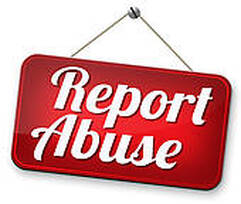 Don’t post on-line that you have been targeted. There’s a good chance that the troll will see your post through the feeds of other people, especially when some people share so indiscriminately. It also encourages other trolls that may see your post. You will be helping them to identify you as a ‘victim’ and trolls love victims. Nothing is private on the internet. You have to assume that your post will be seen by trolls as well as by nice people. If the abuse is really bad, especially if it is racist, homophobic, transphobic, misogynistic or similarly harmful, report it to the police and contact the platform owners using a more direct route than the simple reporting tools that are available. Somewhere there will be a corporate email address or phone number you can use – so use it. Make sure that they understand the emotional impact the trolling is having on you. Make them take responsibility for the bad behaviour of the users of their site. "But we all need to think about our own behaviour" Now all I can do is wish you a happy and a troll free week. But we all need to think about our own behaviour, too. Any of us could be considered to be a troll simply because of the language we use. There is a simple rule to follow: ask yourself if you would say it to someone’s face. If the answer is ‘no’, then its best not to say it at all. Or rephrase it in a way that would allow you to say it to their face. Other than trolls, hardly anyone ever sets out to be offensive, but it’s very easy to cause offence by accident. If you have enjoyed this blog or if you have found it informative, be sure not to miss any future posts by subscribing to our newsletter. Just click on the button below. We promise not to spam you (or troll you).  Following on from last week’s blog about literary figures insulting each other, I received quite a few emails giving examples of more general insults. So many, in fact, that I have decided to do a blog just on them. First of all, some of these may be quotes from the writings or speeches of other people, living or dead, so I beg forgiveness from those whose words I have used without giving them the usual citations and credit. However, so many of these are now going around the internet that they almost fall into the category of “public domain” – even if they don’t fit the legal definition of that phrase. So, be flattered that your words have found such fame. But my thanks to all my readers who have taken the time to send these in. Without you I would have had to apply some original thought to write this week’s blog and that would have made my head hurt. I’ve tried to place all of these into categories, but some would fit into more than one and some don’t fit anywhere, so I’ve included them under “miscellaneous”.  Appearance
You’re not ugly, you’re just someone it’s hard to look at. You’re so fat, people jog around you for exercise. (I could have done a whole blog on fat jokes alone, but this is my favourite). I’m not saying you’re ugly. It's just that you're 8 beers away from being my type. Who gave you that haircut? Do you want me and the boys to go around and beat him up? Mirrors can’t talk. Lucky for you they can’t laugh either. Halloween finished yesterday, so you can take your mask off now. You are living proof that there is no God, because God is supposed to have created mankind in his own image and no one would worship a face like yours. Everyone has the right to be ugly, but you abuse the privilege.  Dress sense I’m sorry, were we supposed to dress stupid today? I know that sometimes fashions come back around a second time, but you won’t see that style again until the next time Halley’s comet appears. I know your look is supposed to be ‘old school’ but schools were never that old. You do know that this office doesn’t have a “dress down Friday”, don’t you? Besides, which, it’s Monday. Wurzel Gummage was on the phone. He asked if he could have his suit back. I see you had another power cut while you were getting dressed. I didn’t realise you were so brave until I saw what you were wearing.  Ego NASA called; they asked you to step to one side because your ego is blocking out the Hubble telescope. It’s been several centuries since they discovered that the world revolves around the Sun and not around you. NASA called. They’ve finally built a rocket big enough to match your ego. Your biggest fan is the one on the ceiling. Do I think you’re clever? I’m sorry, but my mother taught me not to lie. If you were as great as you think you are, someone else would have noticed by now. You are the very definition of “Z List celebrity”. Do I know who you are? Of course I do. But I have to serve you or 'll get lose my job. 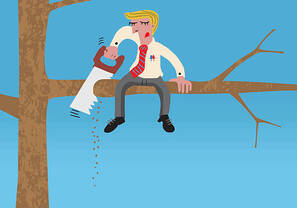 Intelligence I’m surprised at your level of stupidity. If stupidity was a currency, you would be a billionaire. Of course I talk like an idiot. How else could you understand me? Your head is just there to keep your ears apart. I can explain it to you, but I can’t understand it for you. Fools are temporary, but stupidity like yours is forever. If brains were dynamite, you wouldn’t have enough to blow your hat off. Somewhere out there is a village that’s lost its idiot. I’d have to have my head amputated before my IQ would be as low as yours. Without stupidity, there would be no way of recognising intelligence, so in that sense you are important. It’s always been said that two heads are better than one, but not when one of them is yours. It’s the university on the phone. They’re trying to find out how long a human can live without a brain and want to know how old you are. Quick, stand next to me. I need to look good and next to you I look like a genius. I used to say “please engage brain before speaking”. Then I met you. Now I say “please engage brain before thinking”. It’s a good job that stupidity isn’t a crime or you would be serving a life sentence. I’ve just realised that you aren’t as stupid as you sound. No one could be that stupid and still be capable of breathing. Miscellaneous Please don’t interrupt me when I’m ignoring you. Allowing you to survive childbirth was medical malpractice. I’d slap you, but that would be animal abuse. How can I insult you? Nature has done such a great job already. Do you still love nature, despite what it did to you? I went looking for your family tree and it turned out to be a bonsai. My door is always open, so feel free to leave anytime now. Of course I’ve got time to see you. How about 30th February? Be kinder to your parents. Don’t go home so often. I've researched your family crest. Apparently it's an anchor with the letter W above it.  Offence (the taking of) You find it offensive? I find it funny. That’s why I’m happier than you. You only feel offended because what they said applied to you. Honestly, I didn’t mean to cause offence. That was just a happy accident. (Best read in a Yoda voice) Cause offence did I? Don’t care a bit do I. I will defend to the death your right to be offended if you will defend to the death my right to cause offence. No, I wasn’t offended. He was right, I am a stupid idiot. And you are an even bigger idiot for not knowing that.  Personality I won’t say you are shallow but compared to you a puddle has hidden depths. Life is good, you should get one. You are an oxygen thief. You are a waste of good skin. I’d like to say it’s been a pleasure meeting you, but I’d be lying. I’ve just discovered that there is a God. I asked him to punish me and then you turned up. Compared to hearing one of your stories, the ticking of a clock is an entertainment. With all the wonders of technology: photoshop, auto-tune, plastic surgery, it’s such a pity that there’s nothing it can do to improve your personality. You have given a whole new meaning to the expression “sour grapes”. You are the photoshop of truth telling. Yes, you can help me solve my problem. Go away. Being here with you makes me want to go to the dentist. It will be so much more fun. That wasn’t a round of applause, that was just everyone slapping their own faces trying to stay awake while they listened to you. 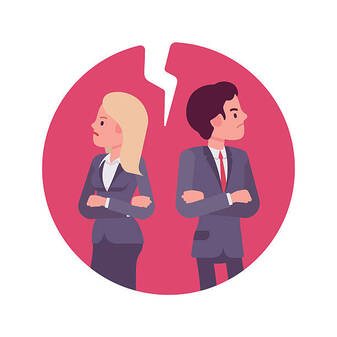 Relationships. My phone battery lasts longer than your relationships. You deserve someone like you. You two deserve more credit. Thanks to you, two other people are living happier lives with someone else. I’d say you had bad taste in men, but then again, in life you get what you deserve. Sleeping around isn’t classed as a hobby. Relationships aren’t like shopping. You don’t get a bigger discount the more people you sleep with. When I asked the name of your last sexual partner, I didn’t expect the name of a football team. And finally If you are the sort of person who enjoys insulting others, just remember that what goes around, come around. And if your favourite insult isn’t amongst the ones above, please feel free to send it to me and it may appear in a future blog. if you have found this blog interesting or informative, make sure you don't miss future editions by signing up for our newsletter by clicking the button below. We promise not to spam you and you can unsubscribe at any time. Don't Despair; Help Is At hand Just a note for all our readers around the world, although this blog is aimed primarily at our British audience (we’re a British business), the key messages in it are just as valid wherever you live, so please, continue to read as it will be of benefit if you have lost your job or are in danger of losing your job. Let’s face it, it’s been a rough 15 months and we’re still not out of the woods. And for a few people, things are going to be a lot tougher for a while. In 2019 the UK unemployment rate was around 3.8%. The current economic forecast is that it will rise to around 5.5% this year before starting to fall back again as the economy starts to grow once more. In 2019, about 32.41 million people were in employment, so a reduction of about 2% means that some 640,000 people have become unemployed already or will become unemployed this year. If you are one of them, you have my sympathy. I’ve been there and I know how that feels.  And if you are leaving school or graduating from university this year, that will also mean more competition for what work vacancies there are. So, this blog is aimed at you too. A lot of businesses have gone bust, throwing people out of work. As the country starts to return to “normal”, whatever that means, the present furlough scheme will end and more businesses will shed the staff that have been protected against losing their jobs up until now. So, if you are one of those 640,000 people who have already lost their jobs or are in danger of losing their jobs, or a student about to enter the jobs market, reading this blog could be the most important thing you read this year. "losing your job isn’t your fault" The first thing you must tell yourself – every day if need be – is that losing your job isn’t your fault. You have done nothing for which you should blame yourself. You may be surprised to find out that many people do blame themselves and it always hold them back. (If you have been sacked for misconduct then it may be your fault, but that is a different issue and will require different solutions) 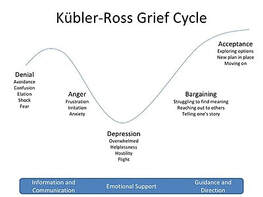 The next thing you should try to do is get over the loss of your job. You will experience all the feelings associated with losing a loved one, known as the grief cycle. Try to get through this as quickly as possible because if you don’t, it will hold you back in your search for a new job. It is quite normal to feel this, so don’t worry about it. To use a couple of well-worn cliches, you have to get past this and you have to move on.  The next cab off the rank is to understand that looking for a new job is a full time job in itself. If you aren’t spending the majority of your waking hours looking for work, you aren’t going to find it. Trust me, no one is going to come knocking at your door to offer you a job while you’re watching Phil and Holly on daytime TV. The job you want is out there somewhere, but you have to go out and find it, because it ain’t coming to find you. The next thing you must do is acknowledge that all jobs are temporary. Yes, you may have thought your job was permanent, but now you have been proven wrong. You knew this already but probably didn’t know that you knew it or you didn’t want to acknowledge it. "a job isn't for life"  You knew it because, wherever you worked, people came and people went. How many leaving presents have you been asked to contribute to in your working life? And I don’t mean for people who were retiring. A job isn’t for life. A job is for as long as you want to do it or until something better comes along – or until the company no longer needs you or can no longer afford you. So, if all jobs are temporary, then don’t sit around waiting for the perfect job to come along. It is a luxury you can’t afford right now. Instead take a temporary, if imperfect, job and keep looking for the perfect one. It’s better to earn some money than to earn no money. Believe me, living on state benefits will never cover all your costs. There is another reason for taking a temporary job while you continue looking. Employers don’t like to see gaps in your CV (or resumé, for some of our readers) while you were doing nothing.  It’s hard to convince a prospective employer that you are highly motivated and a ‘self-starter’ if you aren’t willing to flip burgers or deliver pizzas while you are waiting for him or her to offer you your dream job. Yes, I know that you worked hard for many years to gain the qualifications and skills that you now have, so you wouldn't have to flip burgers or deliver pizzas. But that is your pride talking. Pride isn’t going to pay the bills and pride will leave a nasty gap in your CV which you WILL be asked about at interviews. "It demonstrates to a prospective employer that you are willing to develop yourself." You need to prove your willingness to work by taking jobs that you wouldn’t normally consider. It’s about painting a picture to go with the story you want to tell at your interviews. If you really can’t consider doing a job that means taking a cut in salary or working unsociable hours or whatever your reason, then learn some new skills instead.  Firstly, it provides an explanation for what you were doing while you were unemployed but, more importantly, it demonstrates to a prospective employer that you are willing to develop yourself. That is a highly prized asset in today’s workplace. And it doesn’t have to cost you anything. There is an organisation called Future Learn who provide free on-line courses on a wide range of subjects and they can be accessed from anywhere in the world. Their content is also provided by some blue-chip global educational bodies. Most are suitable for non-graduates, so don’t be put off if you didn’t go to college. If you want a certificate to say you completed a course, you may have to pay, but some of the courses do provide them for free. Other training providers are available, but Future Learn is the best we have come across. Most of the courses can be completed in a day if you want to binge, but you can work at your own pace and at times that suit you eg when Phil and Holly are on TV. Learning a new skill is far more beneficial than having your brain turned to mush by daytime telly.  Stand out from the crowd with better skills Stand out from the crowd with better skills Hot topics at the moment are: collaborative and team working skills; leadership capabilities; business skills (always a good area for technical personnel to develop new skills); psychology (especially in relation to leadership), IT skills, creativity and innovation. Getting a few of those subjects under your belt will enhance your employability, especially if you can describe to prospective employers how you can use those new skills to help their business. But you are not alone in this job search. Help is available, which is why we are posting this blog.  One of our authors is something of an expert in this area and wrote a book on the subject. Yes, we admit it, this whole blog is nothing more than a thinly disguised book plug. But we really do want to help. The advice Robert Cubitt offers in “I Want That Job!” really does work. We know it works because we know people who have read the book and who now have new jobs. Above all it is practical, not theoretical. Just click the cover image to find out more. Now, if you have enjoyed this blog or found it helpful, be sure not to miss an edition by signing up for our newsletter. Just click the button. |
AuthorThis blog is compiled and curated by the Selfishgenie publishing team. Archives
June 2025
|
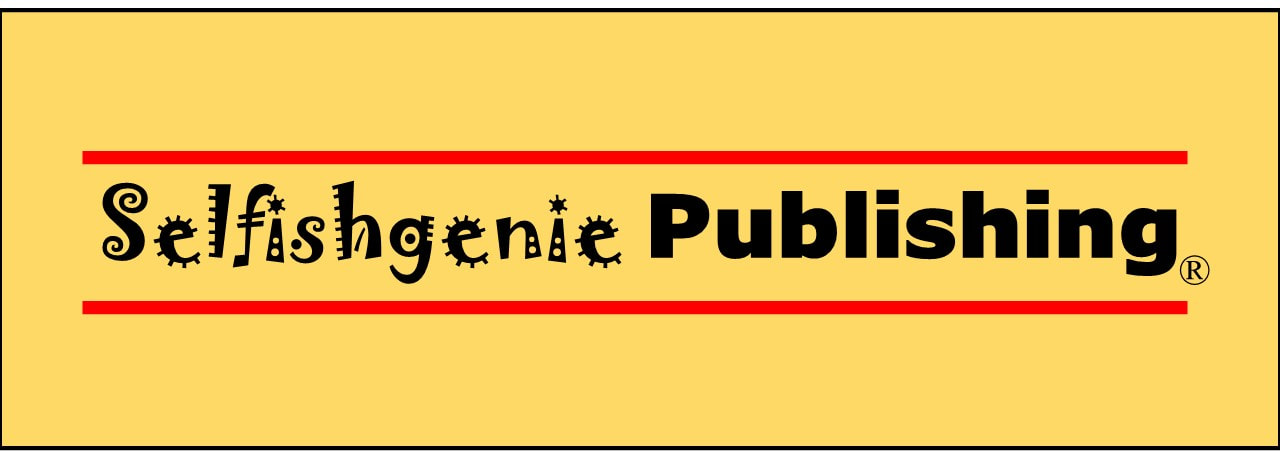
 RSS Feed
RSS Feed